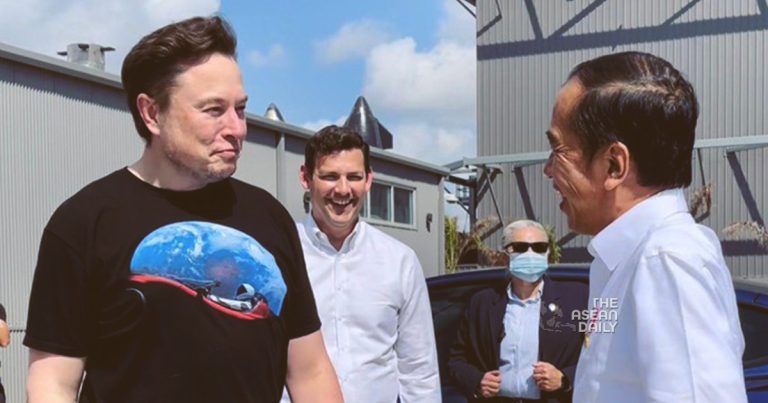20-2-2024 (JAKARTA) In an unexpected turn of events, Elon Musk, the visionary entrepreneur behind SpaceX, has emerged as a pivotal player in Indonesia’s quest to strengthen its communication networks and space ambitions. This development comes in the wake of a setback faced by the Southeast Asian nation when a Chinese rocket malfunction in April 2020 destroyed its $296 million Nusantara-2 satellite.
The incident, which dealt a blow to Indonesia’s efforts to bolster its communication systems, presented an opportunity for Musk to outmanoeuvre China Great Wall Industry Corp (CGWIC), a state-owned Chinese company that had previously been Jakarta’s preferred choice for satellite launches.
According to senior government officials and industry insiders in the Indonesian capital, the malfunction marked a turning point for Indonesia to shift away from Chinese space contractors and towards companies owned by Musk.
Prior to the incident, Nusantara-2 was the second satellite launch awarded by Indonesia to CGWIC, matching the two launches previously handled by SpaceX. Since the failure, SpaceX has launched two Indonesian satellites, with a third scheduled for Tuesday, February 20th, while China has not been entrusted with any launches.
SpaceX’s edge over Beijing stemmed from a combination of launch reliability, cheaper reusable rockets, and the personal relationship Musk cultivated with Indonesian President Joko Widodo. Following a meeting between the two men in Texas in 2022, SpaceX also secured regulatory approval for its Starlink satellite internet service in Indonesia.
The SpaceX deals mark a rare instance of a Western company making inroads in Indonesia’s telecommunications sector, which is dominated by Chinese companies offering low-cost solutions and easy financing. These successes came after Indonesia resisted US pressure to abandon its deals with Chinese tech giant Huawei, citing its dependence on Beijing’s technology.
“SpaceX has never failed in launching our satellites,” said Sri Sanggrama Aradea, head of the satellite infrastructure division at BAKTI, an Indonesian communications ministry agency. He added that the April 2020 incident makes it “hard” for Jakarta to turn to CGWIC again.
The tussle between SpaceX and China offers a window into a much larger battle to dominate the rapidly expanding space industry. The global satellite market, including manufacturing, services, and launches, was worth $281 billion in 2022, or 73 percent of all space business, according to US consultancy BryceTech.
China launched a record 67 rockets last year, out of 223 globally, according to a report by Harvard professor and orbital tracker Jonathan McDowell. The vast majority were launched by CGWIC. This puts China behind only the United States, which had 109 launches, 90 percent of which were carried out by SpaceX, the report found.
Washington and Beijing are also competing over satellite-based communications networks. SpaceX’s Starlink, which owns around 60 percent of the roughly 7,500 satellites orbiting Earth, is dominant in the satellite internet sphere. However, last year, China began launching satellites for its rival Guowang broadband mega-constellation.
Unlike its Chinese counterpart, NASA relies primarily on privately owned rockets from firms such as SpaceX, which has billions of dollars in US government contracts. However, the US government and military are concerned about their reliance on SpaceX, especially given Musk’s muscular business style, according to current and former US officials working on space policy.
While legacy US defence contractors like Boeing and Lockheed Martin typically consult the State Department before making foreign deals, Musk and SpaceX dealt directly with Jakarta, the officials said.
Nonetheless, Musk’s deals bucked a long-running trend of Western firms losing out to Chinese businesses in Indonesia, a sprawling archipelago of more than 17,000 islands and home to over 270 million people.
In May 2022, Jokowi, as the powerful Indonesian president is popularly known, visited a SpaceX facility in Boca Chica, Texas. During the visit, Musk asked Widodo to allow Starlink into Indonesia, according to a source with direct knowledge. Less than a month after the Texas meeting, Telkom, a state-owned telecoms firm, announced that its subsidiary had received Starlink landing rights.
“Musk put that ask on the table then and there, so things started,” said the source, referring to the May meeting. Widodo’s spokesperson confirmed that Musk and the president discussed opportunities in Indonesia, adding that officials are still in communication with the billionaire about future investments by his businesses, including Tesla.
Last June, SpaceX’s Falcon 9 rocket pushed into orbit the 4.5-tonne Satellite of the Republic of Indonesia (SATRIA-1) – Southeast Asia’s largest satellite. Nia Satwika, a SATRIA-1 project manager, said SpaceX offered lower costs and had higher availability of launch slots when compared with other operators. “They are a game changer,” she said, referring to SpaceX’s ability to reuse parts of its rockets – a crucial cost advantage over rivals.




